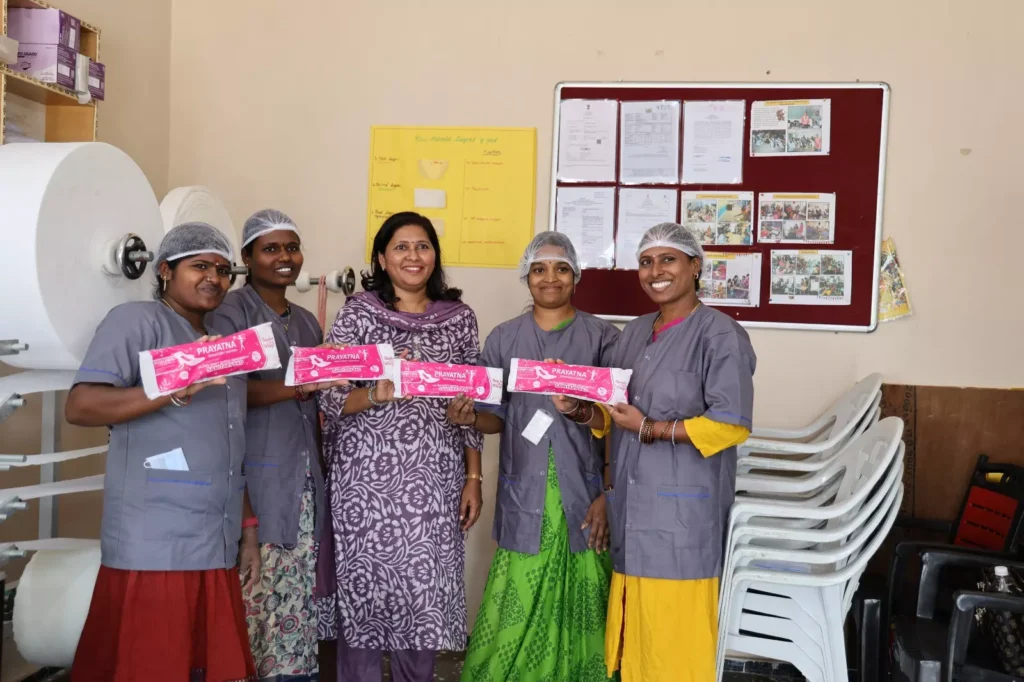Hyderabad: Chinna Golconda village in Shamshabad upazila of Rangareddy district has witnessed a quiet transformation. What started as a small initiative to support a women’s self-help group has transformed into a significant movement that is not only empowering women but also rebuilding the community.
The sanitary napkin making unit, ‘Prayatna’ (attempt), is an initiative led by village women, leaders and decision makers.
Manisha Patil, head of CSR community engagement at Amazon India, which is supporting the initiative, recalls, “When we started in 2014, our goal was to be good neighbors and partners in the communities around our warehouses. We started by assessing the needs of the community, including women, youth, and people with disabilities. Our model had to be holistic.”
Initially, working with non-profit organizations helped us set up a few community centers offering early childhood intervention, career counseling, computer learning, etc. It soon became clear that we needed to ensure sustainable empowerment from the communities themselves. Thus, the Community Ambassador model was born. The concept was simple: train local villagers who had the desire and will to contribute to their community through initiatives.
The sanitary napkin manufacturing unit is one outstanding success story of this model. “The idea for the unit came from the women themselves,” explains Patil.
“They wanted local solutions that would not only address their menstrual hygiene issues but also provide them with the means to earn a livelihood.”
Sharing her perspective, Community Ambassador and Unit Leader Shravanti Saud said, “Prayatna symbolizes our collective efforts. When our husbands lost their jobs during the Covid pandemic, we managed to support our families. From sewing masks for the government to making sanitary napkins, we learnt new skills. Becoming the breadwinners for our families has been empowering.”
The women receive comprehensive training, from the technical know-how of production to marketing and branding. “From production to packaging to sales, the women have mastered it all. They now confidently meet local officials and corporate representatives to promote their products. We wanted them to manage the entire process themselves,” said Patil.
This initiative has not only made them financially independent, but also empowered them with self-reliance and self-confidence. Women who were previously hesitant to discuss menstrual hygiene even with their families are now taking on the responsibility of educating them about the need to use sanitary napkins in schools and health centres.
“We visit kirana shops and local schools and explain why menstrual hygiene is important. Our aim is not just to sell products, but to change attitudes and improve health,” said Mamata, who works at the unit.
Community ambassadors like Sharvanthi and the support of local panchayats played a key role in making the model a huge success. “The panchayat provided the space and we brought the expertise. Together, we ensured the success and sustainability of the programme,” Patil said.
There are now over 1,800 community centres operating across the country. The collaboration between corporate expertise and community needs has enabled the initiative to scale effectively. Patel attributes this to the strong partnership with villagers and the tireless efforts of community ambassadors.
Amazon India has also promoted women’s health and menstrual hygiene through education programs in schools to create awareness among teenage girls. “Addressing menstrual hygiene at an early age is crucial – it forms healthier habits and removes stigma against a natural biological process,” Patil said.
On World Menstrual Hygiene Day, the story of Chinna Golconda is a shining example of how communities can take control of their own destiny when equipped with the right tools through the Corporate Social Responsibility model of organisation.
As Patil aptly put it, “This initiative is not just about producing sanitary napkins. It is about creating opportunities, building confidence and creating a sense of ownership among women. It is about transforming lives, one prayatna at a time.”

